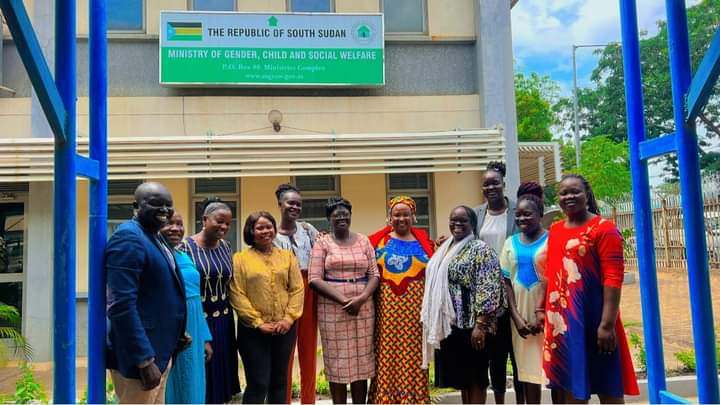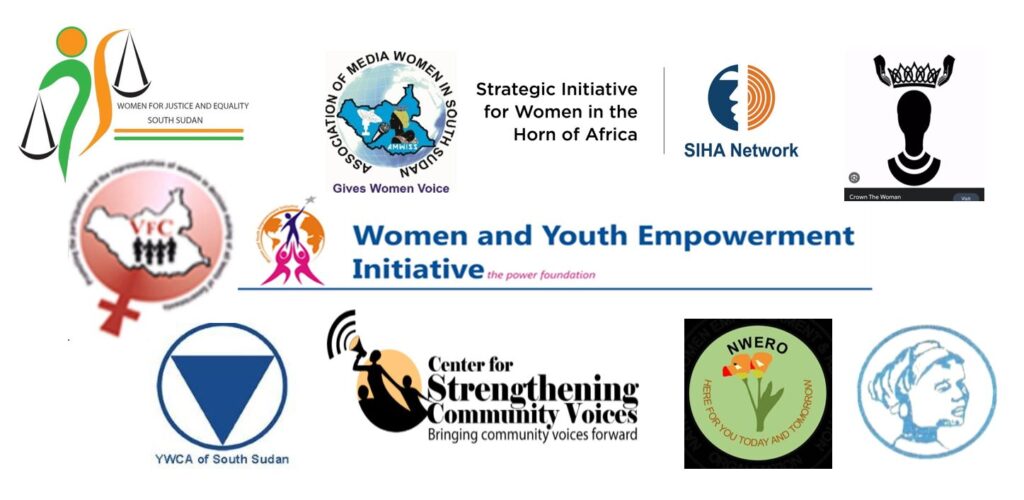
We, as South Sudanese women are deeply concerned by the limited effort or commitment by the Government to implement the Revitalised Agreement on the Resolution of the Conflict in the Republic of South Sudan (R-ARCSS), in accordance with the roadmap document.
As women living in internally displaced person (IDP) sites in Juba and within five blocks of Wau Municipality, we came together to hold a dialogue on our perceptions of peace. Through this collaborative dialogue, we have developed the following statement to advocate for the full implementation of the R-ARCSS, drawing particular attention to the commitment of all parties in the Revitalized Transitional Government of National Unity (RTGoNU) to include women in the planning and decision-making for the processes of reconciliation and healing, transitional justice, and accountability as cornerstones of the path to peace in the country.
During the dialogue, we collectively established that for peace to be achieved, there must be freedom of movement, no war, no tribalism, no racism, an end to using women’s bodies as a weapon of war, all displaced people within South Sudan are able to leave the camps and return home, and finally that there is no violence against women and girls. These elements cannot be realized without key steps by the Government, for example, the establishment of essential societal institutions like hospitals, schools, prisons/juvenile prisons designed for rehabilitation, and vocational training centers to produce job creators and not job seekers. We feel the Government must do more to promote harmony amongst South Sudanane people living in the same communities, including a focus on ensuring sufficient employment for the youth, and that women and girls’ social and economic rights are realized and protected.
As the Government fails to adhere to the roadmap laid out for the implementation of the R-ARCSS, obstacles to peace continue to persist in multiple sectors of society. There is still a big gap in women’s meaningful political participation in decision-making, leadership, relief, and recovery. We are deeply concerned by the removal and replacement of women from key leadership positions by men at national and state levels. This phenomenon shows a lack of respect for the 35% minimum representation for women, violating a gender-sensitive aspect of the R-ARCSS.
There is still a high prevalence of guns in the hands of civilians and conflicts between the farmers and the cattle keepers have been escalating. This has resulted in communal conflicts, cattle rustling, revenge killing among others, leaving many women widowed and children orphaned. It has also led to an increase in street children due to rural-urban migrations across South Sudan. These factors contribute to an increase in the prevalence of sexual and gender-based violence (SGBV), and hinder access to education and meaningful participation for the young generation, who are the future leaders of the country.
Despite Section 4.15.1.5 of the R-ARCSS, which highlights the need to establish a women’s enterprise development fund to provide subsidized credit and capacity building for women entrepreneurs, there are still numerous barriers to women’s access to economic justice and full enjoyment of their rights, including ownership of land and property. Prevailing customary practices in most of South Sudan have historically deprived women from land ownership, limiting women’s access to fundamental human rights and impeding their ability to accumulate economic resources and exercise decision-making power.
We as South Sudanese women peace activists therefore call upon the Government of South Sudan to:
- Scale up the implementation of the Revitalised Agreement on the Resolution of the Conflict in the Republic of South Sudan (R-ARCSS) in accordance with the timeline and steps laid out in the roadmap for the R-ARCSS.
- Adhere to the implementation of Chapter 5 of the Revitalized Agreement on the Resolution of the Conflict in the Republic of South Sudan (R-ARCSS), specifically Section 5.1 Agreed Principles for Transitional Justice, subsection 5.1.1, which states, “upon establishment, the RTGoNU (Revitalized Transitional Government of National Unity) shall initiate legislation for the establishment of the following transitional justice institutions (observe the 35% women representations in these institutions) – the Commission for Truth, Reconciliation and Healing (CTRH); An independent hybrid judicial body, to be known as the Hybrid Court for South Sudan (HCSS); Compensation and Reparation Authority (CRA).”
- Conduct massive disarmament among the cattle keepers’ communities and civilians to allow women to move freely and have access to farmlands – in order to feed their families – without being raped, assaulted, or killed. Disarmament must be accompanied by the fostering of peaceful coexistence dialogues between farmers and cattle keepers.
- Adhere at the national and state levels to the principles of economic justice, that is, universal basic income, income equality by gender and race, and equal opportunity for employment and credit.
- Ensure that women are included in all roundtable discussions regarding peace processes at the state, national, and regional levels.
Signatories
- Angelina Wel-Activist
- Center for Strengthening Community Voices
- Crown the Women (CREW)
- Female Journalist Network (FJN)
- Flora Lokudu-Activist
- Girls Voices for Change
- Jennifer James-EBC Radio
- MADA Women Development
- National Women Empowerment and Rehabilitaion Org (NWERO)
- Nyalel Gatluth-Activist
- Organization for Nonviolence and Development (ONAD)
- Strategic Initiative for Women in the Horn of Africa (SIHA Network)
- Voice for Change (VFC)
- Vera Agnes-Activist
- Voice of the Voice of the Voiceless Girls Association
- Women and Youth Empowerment Initiative
This statement was presented to the Ministry of Gender, Child and Social Welfare of the Government of South Sudan by the above-listed group of civil society and women’s rights activists and organizations

